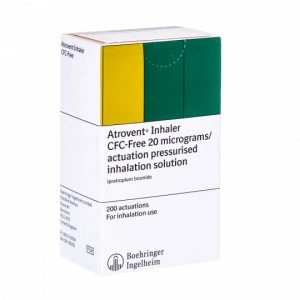Asthma
Asthma is a common lung condition which causes occasional and often debilitating breathing difficulties.
Prescription Doctor can offer treatment for asthma that can be delivered safely and discreetly directly to your home.
To learn more about the causes and treatments of asthma, continue reading. Alternatively, you can proceed to the medical form below.
Airomir
- Relieves bronchospasm
- Pump-actuated inhaler
- Contains salbutamol
Atrovent
- Prevents bronchospasm
- Available for a repeat order
- Dispensed from UK-registered pharmacy
Bricanyl Turbohaler
- Fast relief from symptoms
- Easy-to-use dry inhaler
- Available from our UK pharmacy
Clenil Modulite Inhaler
- Used daily to prevent asthma symptoms
- Pump-actuated inhaler
- Contains Beclometasone
Fostair Pink Inhaler
- Combined asthma treatment
- Prevents bronchospasm
- Available via next-day delivery
Peak Flow Meter
- helps you monitor your lung function
- detects early warning signs of asthma
- Decide when to seek emergency care
Pulmicort Turbohaler
- Prevents asthmatic symptoms
- Easy to use Turbohaler
- Active ingredient Budesonide
Qvar
- Prevents asthmatic symptoms
- Available in different inhalers
- Next day delivery
Salamol cfc free inhaler
- Salamol is used to treat asthma
- Same ingredient as Ventolin
- Used for asthma and COPD
Seretide
- Regular treatment of asthma
- Relieve Chronic Obstructive Pulmonary Disease
- Available Online
Symbicort Turbohaler
- Prevents asthma symptoms from occurring
- Counts remaining doses
- Active ingredient budesonide
Ventolin
- Relieves symptoms fast
- Evohaler and Accuhaler
- Active ingredient salbutamol
What is Asthma?
Asthma is a chronic lung condition which causes occasional and often debilitating breathing difficulties. It typically begins in childhood but can affect individuals of all ages.
Asthma tends to be hereditary, particularly if there's a history of smoking and allergies. Adults can also suffer from Asthma and associated conditions such as COPD, especially if they smoke or are exposed to irritants.
According to the British Lung Foundation, around five million individuals in the UK are affected by asthma. While there's no cure for asthma, treatments can manage your symptoms so they don't negatively impact your life.
If you are unsure whether you have asthma, it's essential to consult your GP. Your doctor may be able to diagnose you with asthma or refer you to a specialist who can diagnose you.
What is COPD?
Chronic Obstructive Pulmonary Disease (COPD) is a progressive lung disease that causes your airways to become inflamed, restricting oxygen flow to the lungs.
When this occurs, the body tissues in the lungs receive less oxygen, making it more difficult to exhale carbon dioxide. If left untreated, you become short of breath, making it difficult to stay active.
Sometimes individuals will have symptoms of both emphysema and bronchitis; therefore, doctors like to refer to the condition as COPD. However, other doctors still believe that a person can have chronic bronchitis even if they don’t have airway obstruction, a key characteristic of COPD. Your physician will provide you with details about your condition and the most effective treatment options.
Many cases of COPD are preventable and treatable. Some medicines prescribed for asthma to reduce inflammation in the lungs can also help those suffering from chronic obstructive pulmonary disease.
What Causes Asthma?
It's unknown why certain individuals develop asthma, and others don't. However, it's likely due to a combination of genetic and environmental factors. Many believe our lifestyle choices can be a contributing factor to developing asthma.
These lifestyle choices include:
- Diet
- Housing
- Environment
Certain substances and irritants can trigger allergies, which can, in turn, trigger asthma symptoms.
Triggers of Asthma
Asthma triggers vary among people and may include:
- Respiratory infections, like a cold
- Airborne substances like dust mites, pollen, pet dander or mould spores
- Cold air
- Cockroach waste
- Air irritants and pollutants like smoke
- Strong stress and emotions
- Certain medicines like aspirin, beta-blockers, naproxen (Aleve) and ibuprofen (Motrin IB and Advil)
- Preservatives and sulphites in certain foods and drinks like dried fruit, shrimp, beer, wine and processed potatoes
- Physical activity
- Gastroesophageal reflux disease (GERD)
Symptoms of Asthma
Asthma, as mentioned, inflames the airways, which can cause long-lasting inflammation that requires constant management, typically through lifestyle changes and medications. An asthma attack can occur at any moment. When you have mild symptoms, they will likely only last for several minutes; if your asthma symptoms are more severe, they can last for hours or even days.
Common asthma symptoms include:
- Wheezing
- Coughing
- Chest tightness
- Rapid breathing
- Shortness of breath
Many things trigger these symptoms. However, chances are it's asthma if they:
- Get worse in the morning and at night
- Happen frequently and continue coming back
- Occur after exercise or due to an allergen, like animal fur or pollen
If you suspect you have asthma (or your child), or if you do have it and it’s difficult to control, see your doctor.
What is an Asthma Attack?

An asthma attack is when your symptoms suddenly worsen. You may experience a tightening sensation around your chest due to your swollen airways, which can make breathing difficult. In more serious cases, you may experience dizziness, confusion, and your fingers and lips may turn blue.
Asthma attacks can occur due to stress, anxiety or exposure to irritants and smoke.
It is important to understand how to manage these symptoms. Reliever inhalers such as Salbutamol are effective remedies in treating acute asthma attacks. Usually, one or two puffs, inhaled immediately upon attack, can provide relief from symptoms.
How to Manage Asthma
Managing your asthma can help reduce the risk of asthma attacks and improve your overall quality of life. Avoiding known irritants, such as aerosols and dust, wearing a scarf over your nose and mouth in cold weather, and staying vaccinated against influenza and pneumonia during the winter can significantly reduce your chances of experiencing an asthma attack.
Asthma medication, such as inhalers, nebulisers, and pills, can also offer both short-term and long-term relief, protecting your lungs from damage caused by frequent asthma attacks.
Treating Asthma

Inhalers are common treatments for asthma. These are devices that administer medicine by inhalation.
Asthma inhalers can deliver either a dry powder or an aerosol spray, which requires different techniques for use. Your doctor will demonstrate the correct technique for using your inhaler.
Inhalers are grouped by action and colour coded to denote their mechanism.
Blue inhalers
Short-acting beta-2 agonists (SABAs) - also known as "reliever" or "rescue" inhalers - are typically coloured blue.
These inhalers are used to quickly relieve asthma symptoms when they arise.
Blue reliever inhalers include:
Brown inhalers
Brown inhalers are typically long-acting corticosteroid inhalers used to prevent asthma symptoms from developing.
These include:
Purple inhalers
Inhalers which contain both a corticosteroid and a long-acting muscarinic antagonist (LAMAs) are typically purple or lilac.
Examples of these include:
Pink inhalers
Pink inhalers are similar to purple inhalers in that they combine two classes of medicines.
These inhalers contain both a corticosteroid and a long-acting beta2 antagonist (LABAs) and are used as preventer inhalers.
Fostair belongs to this group of inhalers.
What are the benefits of treating asthma?
When you manage your asthma well, you should be free of your symptoms. Although it may be harder to control severe asthma, the aim of treatment for most asthma patients is to manage the condition so that:
- Your asthma doesn't wake you up at night.
- You don't get symptoms during the day.
- You don't suffer from any asthma attacks.
- You don't require an inhaler.
- Your asthma doesn't interfere with your daily life.
When you manage your asthma effectively, you won't need to use your inhaler as often. Your doctor will also be able to prescribe you the lowest dose of medication to keep your symptoms under control.
You'll even save money if you're not paying for a lot of prescriptions to keep your asthma under control.
Your asthma doesn't just affect your physical health. It can also significantly impact your life and the lives of those around you. Therefore, other benefits of managing your condition are:
- You can exercise, travel and do other things without worrying that your asthma symptoms will interfere
- The people you love will worry less about you
- You won't miss out on being able to play with your kids or other aspects of family life
- You won't require as much time off work because of your symptoms
If your asthma is under control, your doctor could prescribe less medication to treat your symptoms. This improves your quality of life, allowing you to be more active without worrying that your asthma will interfere. However, it can also save you money, as you will not need to pay for numerous prescriptions to treat your symptoms.
How Can Prescription Treatment Help Me?
Asthma medication plays a crucial role in how effectively you manage your condition. It prevents asthma attacks. It helps reduce inflammation in your airways, making them less likely to react to triggers. With the proper medicine, you can live a normal and active life.
Frequently Asked Questions about Asthma and Asthma Treatments
1. How do you treat asthma?
Once you receive your initial diagnosis, your doctor will prescribe treatment depending on the severity of your symptoms and how long you've had them.
2. Are there any side effects of asthma medications?
There is always a risk of side effects from any medication, including asthma medications. However, most individuals don't experience any side effects or very few. Your doctor will only prescribe you medication if they believe the benefits outweigh the risks.
3. Do asthma attacks cause damage to the lungs?
If your asthma attacks are frequent, it could lead to your airways becoming narrower and scarred. Doctors refer to this as "airway remodelling". To prevent this type of lung damage, quit smoking and take all medications, including inhalers, as prescribed.
4. If I'm pregnant with asthma, can my baby get asthma too?
The exact cause of asthma is not known. However, the condition is often genetic. Your baby has a higher chance of developing breathing problems or asthma if:
- You either smoked while pregnant or smoked around the baby
- Both you and your partner have asthma
- If there's only one parent with asthma, the baby is at higher risk if the mother has asthma.
5. Can an asthma attack kill you?
Asthma UK reports that one person has a life-threatening asthma attack every 10 seconds. While most asthma attack sufferers seek help and get better, these attacks kill three people daily in the UK.
Cautions and Exclusions
If you're intolerant or allergic to Salamol, Atrovent, Ventolin or Clenil Modulite or any of the ingredients in them, you shouldn't use any of them. Always inform your prescriber about all medications you're on and previous medications. Also, inform them about any medical conditions you may have.
Authored & Reviewed By

Mohamed Imran Lakhi
MPharm - Lead PharmacistPublished on: 15/03/2018 Reviewed on: 18/05/2023
© 2013 - 2026 Al Muhsineen Limited. All Rights Reserved. Registered Pharmacy: 34 Halliwell Road, Bolton BL1 8RL. Registered Office: 254 First Floor, Shearbrow, Blackburn, England, BB1 8DS


















